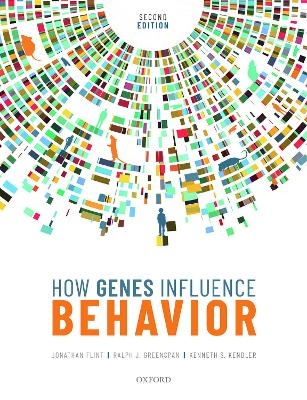
How Genes Influence Behavior
Oxford University Press (Verlag)
978-0-19-871687-7 (ISBN)
How Genes Influence Behavior takes a personal and lively approach to the study of behavioral genetics, providing an up-to-date and accessible introduction to a variety of approaches and their application to a wide range of disorders, and modeling a critical approach to both methods and results.
This second edition includes additional biology content to help students understand the biological foundations of the field, while maintaining an appropriate focus on the main issues of relevance to psychology students; updates coverage of genomic technologies and their applications; and covers a wider range of disorders, including autism spectrum disorder, eating disorders, and intellectual disability. A new final chapter guides students through a range of quantitative approaches using worked examples that relate directly to cases and examples used earlier in the text, and addresses current issues arising from debates around reproducibility.
The online resources that accompany this book include:
For students
* Multiple choice questions for students to check their threshold knowledge
* Data sets for students to manipulate, so that they can apply what they have learned
For lecturers
* Figures and tables from the book, ready to download
Jonathan Flint is a Professor at the University of California Los Angeles where he works on the genetic basis of depression using both human and animal models. Ralph Greenspan is a Professor at the University of California San Diego where he is Associate Director of Kavli Institute for Mind and Brain. He work includes analysis of the genetic control of nervous system development in the fruit fly and mouse, and genetic and neurobiological studies of innate and learned behaviors in the fruit fly. Kenneth Kendler is a Professor at the Virginia Institute for Psychiatric and Behavioral Genetics at the Virginia Commonwealth University. He has conducted family and twin studies on a range of psychiatric and substance use disorders as well as molecular genetic studies on schizophrenia, alcoholism, and depression.
1: Introduction
2: The genetic epidemiology of schizophrenia
3: Molecular biology of nucleic acids
4: Epigenetics, gene regulation, and 'omic technologies
5: Linkage and association
6: Genome wide association studies (GWAS)
7: Molecular genetics of schizophrenia
8: Autism spectrum disorder
9: Intellectual disability and developmental disorders
10: Anxiety, depression, and eating disorders
11: Alcoholism
12: The genetics of intelligence, personality, and personality disorders
13: Genes for what?
14: Genes and the environment
15: Mapping mouse behavior
16: Reverse genetics
17: Mutagenesis and the molecular dissection of circadian rhythms
18: Many vs. One: Genetic Variation in Flies and Worms
19: Comparative genomics
20: How genes influence behavior
21: How do we know a finding is true? Quantitative Approaches
Appendix
| Erscheinungsdatum | 03.01.2020 |
|---|---|
| Verlagsort | Oxford |
| Sprache | englisch |
| Maße | 190 x 246 mm |
| Gewicht | 642 g |
| Themenwelt | Geisteswissenschaften ► Psychologie ► Biopsychologie / Neurowissenschaften |
| Geisteswissenschaften ► Psychologie ► Persönlichkeitsstörungen | |
| Medizin / Pharmazie ► Medizinische Fachgebiete | |
| Naturwissenschaften ► Biologie ► Genetik / Molekularbiologie | |
| ISBN-10 | 0-19-871687-7 / 0198716877 |
| ISBN-13 | 978-0-19-871687-7 / 9780198716877 |
| Zustand | Neuware |
| Haben Sie eine Frage zum Produkt? |
aus dem Bereich


